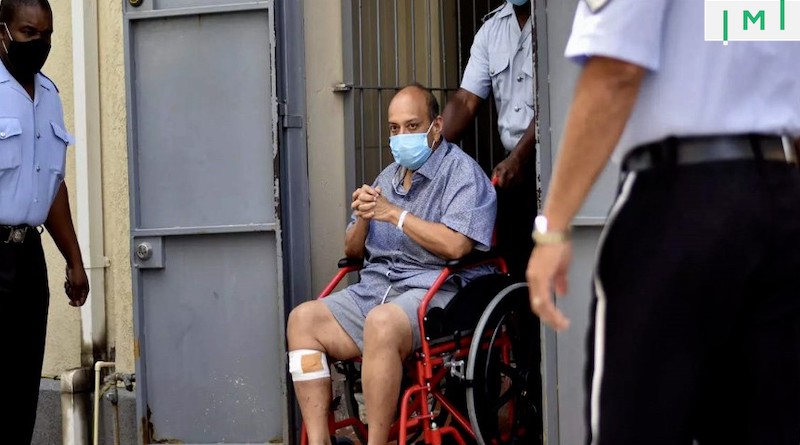Antigua High Court Rules Choksi Allowed to Remain Despite Govt’s Wish to Deport Him
In the latest development in the drawn-out drama of Mehul Choksi, the High Court of Antigua & Barbuda has ruled that the government cannot forcefully remove the alleged absconding diamantaire from the Caribbean country.
Choksi is wanted in India as the chief suspect in the country’s largest-ever bank fraud. Together with his nephew Nirav Modi, he stands accused of having swindled the Punjab National Bank out of some US$1.8 billion.
But it isn’t just the staggering amount of money at play that has made the Choksi case an intriguing legal issue; Choksi’s charges led to a series of events resembling the plot of a spy novel. The Indian fugitive had obtained Antigua & Barbuda’s citizenship just months before his indictment added a layer of geopolitical complexity to his case.
For background on the story, read: A Brief Summary of the Choksi Saga So Far and Its Implications for CBI
Fugitive island hopping
Choksi’s case took a dramatic turn when he was arrested in Dominica for illegally entering the country with an unknown woman. Antigua’s Prime Minister Gaston Browne claimed that “Choksi traveled with his girlfriend.” The jewelry tycoon’s lawyer, meanwhile, argued the woman was part of an Indian intelligence team that kidnapped Choksi in hopes of bringing him back to India to stand trial, stating that “all these theories of Mehul Choksi fleeing from Antigua voluntarily are opposed to common sense,” highlighting that “his passport is in Antigua. Nobody would try to escape without having his passport in his pocket.”
At the time, Antigua & Barbuda refused to take back Choksi, urging the Dominican government to repatriate him back to India. PM Browne was in direct talks with the Dominican and Indian governments to make that happen.
Choksi wasted no time taking advantage of all legal avenues provided to him by law. He has engaged the Antiguan government in court battles since they requested his extradition, and his lawyers also filed a habeas corpus petition against local agents in Dominica, arguing that the conditions of his arrest were unlawful. Choksi’s lawyers argued that the fugitive was “abducted, tortured, and forcibly taken to Dominica,” a claim quickly denied by Antiguan Police Chief Atlee Rodney, who said the police had no other indication or information corroborating the allegations and that “the only assertion we are hearing is from the attorney, and Dominica Police have not confirmed it. We have no involvement in his movement from Antigua to Dominica or wherever he left.”
Choksi also appeared in court in a wheelchair after attending some hearings virtually from a hospital where he was purportedly recovering from injuries sustained during what he says was his kidnapping.
Whatever the case of his arrest was, the petition proved sufficient in forcing the Dominican government to temporarily suspend his extradition.
Prolonged legal battles result in the suspension of extradition
Choksi would later return to Antigua & Barbuda, where he would file a suit against the Antiguan Attorney General and the Chief of Police, arguing that they have an official obligation to conduct a thorough inquiry into “the circumstances surrounding his forcible removal from Antigua and Barbuda on or about 23 May 2021,” and what his team claim to be the “inhuman or degrading treatment or punishment” that he had endured.
The Antiguan courts have since decided that, since Choksi remains a citizen of the country, he has the same legal privileges as any other citizen and will have the right to exhaust any legal avenues, including appeals.
The court order highlighted that “the first defendant is to establish an independent, judicial inquiry as to the circumstances of the claimant’s forcible abduction and removal from the jurisdiction of Antigua and Barbuda on or around 23 May 2021,” and “a declaration that the second defendant has a duty to confirm to the Dominican police that the evidence supports that the claimant was forcibly removed from the jurisdiction and taken to Dominica against his will.”
The court cemented its decision to deny the removal of Choksi, issuing “an order that the claimant may not be caused to leave and/or be removed from the jurisdiction of Antigua and Barbuda without an order from the High Court after an inter-parties hearing and subject to the claimant exhausting any appeals or other legal relief provided by law.”
The defendants argued that no valid complaint exposes a cause of action for failing to conduct an “effective and rapid” investigation within the scope of the jurisdiction under Section 7 of the Constitution.
The Antiguan court order comes mere weeks after Interpol withdrew its Red Notice against Choksi. Sources close to Interpol claim that the withdrawal of the Red Notice aims to give Choksi a chance at a “fair trial given the strong possibility that the 2021 incident was an attempt to extract him,” and his status as a Red Notice fugitive may hamper that.
Antigua’s court order echoes Interpol’s intention, as it aims to give Choksi the right to legal action as any citizen and will allow the government to deal with him within the legal parameters issued based on the court’s findings.
A country ruled by law
Antigua & Barbuda has had to deal with the media storm covering Choksi’s story and has had to sustain criticism for having granted citizenship by investment to a presumed criminal. As IMI has pointed out previously, however, Antigua & Barbuda – or, indeed, any CBI country – cannot reasonably be expected to reject applicants whose crimes are not yet known but does have the means to deal with them if it happens.
The Antiguan government has maintained its stance that it will stick to the letter of the law when handling the case internally and working with relevant foreign governments.
The government has maintained its stance, and even though PM Browne himself has made no bones about his hoping to be able to revoke Choksi’s citizenship and expatriate him back to India, he, too, must observe due process.
Antigua’s handling of Choksi’s case highlights that the country is governed by law rather than by politicians.
Gupta Brothers’ case raise similar questions
Choksi isn’t the only high-profile fugitive with a CBI passport. The Gupta Brothers, South African nationals of Indian origin, also saw a court decision go their way this week when a Dubai court rejected South Africa’s extradition request after their arrest in the UAE.
The Gupta Brothers are wanted in South Africa on fraud and money laundering charges, and the African nation’s efforts to bring them back have been unsuccessful.
The public has blamed the South African and Emirati governments, but Vanuatu has also been in the spotlight, as the Gupta Brothers obtained Vanuatu citizenship by investment in 2019.
The main point of concern is that the Gupta Brothers managed to obtain ni-Vanuatu citizenship by investment despite warnings of “adverse information” from the Ni-Vanuatu Financial Intelligence Unit (FIU).
The FIU had warned the Vanuatu Citizenship Office (VCO) about its findings on two separate occasions, on the 4th and 27th of February 2018.
On the 5th of July, 2018, the Gupta Brothers launched a fresh CBI application, and the FIU” issued the same response to the Citizenship Office.”
The FIU maintained its position of adverse information after numerous meetings with the VCO, and its stance “stated clearly that the brothers were subject to criminal investigations in South Africa. The onus was placed on the discretionary authority of the Citizenship Office and the Citizenship Screening Committee. Thereafter, FIU was unaware of the Gupta Brothers’ citizenship application nor received a request for a fresh review of their applications.”
However, the Gupta Brothers would go on to receive their Vanuatu citizenship, as revealed by the Dubai court papers.
News of the Gupta Brothers’ naturalization under the Vanuatu CIP came as a surprise to South African authorities. South African Department of Justice Director-General Doctor Mashabane declared his surprise, admitting that the issue was “a new development for us because previously their status was that they were carrying South African citizenship.”
Ahmad Abbas is Director of Content Services at Investment Migration Insider and an 8-year veteran of the investment migration industry.



